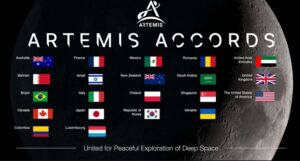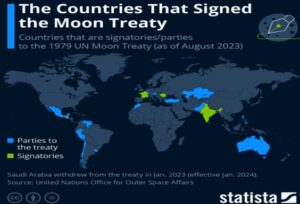Lift–off and the law.
Relevance
- GS 3: Science and Technology- Developments and their Applications and Effects in Everyday Life.
- Tags: #ArtemisAccords #OuterSpaceTreaty #IndianExpressEditorialAnalysis #GS3 #IE.
Why in the news?
Recent developments in India’s space program, including international collaborations and Chandrayaan 3, have sparked discussions about outer space’s status as a “Global Common,” shaping the future of space activities and resource management.
Exciting Year in Space Diplomacy
- Artemis Accords: India joins the US in the non-binding Artemis Accords, aligning with the Outer Space Treaty and international agreements for cooperative space exploration.
- Deepening US-India Engagement: The establishment of US-India Civil Space and Commercial Space Working Groups signals strengthened collaboration, increasing excitement.
- Chandrayaan 3 Triumph: A significant milestone was achieved with the successful landing of Chandrayaan 3 on August 23.
These developments hold profound implications for the future of peaceful space activities and may even influence the evolution of the Outer Space Treaty.
Is Outer Space a “Global Common”?
Definition of Global Common: The concept of global common historically refers to areas beyond any state’s sovereignty, preserving universal access and benefits. It’s rooted in Grotius’s “free sea” idea, focusing on shared resources.
UN-Identified Global Commons
The United Nations recognizes four global commons:
- High Seas
- Atmosphere
- Antarctica
- Outer Space
Debate Over Outer Space
- The question of whether outer space qualifies as a global common has arisen due to the potential for off-Earth commercial resource extraction and utilization in the 21st century.
- Negative Standpoint: Some firmly deny outer space’s classification as a global common, citing concerns about commercialization and resource exploitation.
- Supporters of Global Common Status: Others argue in favor of outer space being a global common, emphasizing its importance in ensuring that developing nations can enjoy the principles of freedom of access and shared benefits enshrined in the Outer Space Treaty.
Dual Perspectives on “Global Commons”
In the lack of a definitive definition, there are two ways to look at global commons.
Enabling Perspective
It is typically seen as an enabling idea when brought up in geopolitical or military context. It is not surprising that security establishments around the world view domains outside of national jurisdictions, such as the high seas, air space outside of territorial bodies of a state, and outer space, as crucial connecting channels for the international order when we consider “global common” from these perspectives.
Security Considerations
- Others see space as a crucial operating area for maintaining national security and preserving international law.
- After all, by what rationale could the high seas still be considered a “global common” if outer space was rejected? How, therefore, could the QUAD, a multilateral regional security project, continue to officially demand freedom of navigation?
- Open access is essential for a country’s economy and security.
Global Commons as a Constraining Concept
- Second, regardless of national authority, the notion of a “global common” is perceived as being restrictive due to the economic and commercial implications of shared resources that may be abused by some at the disadvantage of others.
- Because the term “commons” connotes shared ownership, public control, or usage restrictions, many people view it as being restrictive.
“Commons” and the “Common Heritage of Mankind” (CHM)
- The term “commons” is also occasionally linked to the Moon Agreement’s Article 11(3), which defines “commons” as the “common heritage of mankind” (CHM).
- The CHM was a novel idea that established a territorial status in which the resources and fruits of the Moon and other celestial bodies are likewise seen as belonging to all of mankind.
Common Heritage of Mankind beyond Outer Space
- CHM is not just found in space.
- A non-binding resolution by the UN General Assembly in 1970 established that the seabed, ocean floor, subsoil beyond national jurisdiction, and their resources are part of this concept.
- Incorporation into Law: Article 136 of the United Nations Convention on the Law of the Sea (UNCLOS) in 1982 formalized this principle.
- It defines the high seas as a “global common,” enabling freedom of navigation and access for all.
- Due to resource-related limitations, some people even view the deep seafloor as a “global common,” but in a more restrictive sense.
Outer Space: From Superpower Dominance to Global Accessibility
- Post-Sputnik Diplomacy – The passage of UN General Assembly Resolutions 1721 A&B (XVI) on December 21, 1961, and subsequent adherence to its terms was driven by geopolitical concerns after the launch of Sputnik in 1957, which made the US and the USSR the only space superpowers at the time.
- Precedent for All: All Space exploring nations have since followed this precedent, consistently abiding by the terms of these resolutions. Over decades, the principles outlined in the Outer Space Treaty of 1967 have evolved into customary international law.
- Democratization of Outer Space: Today, outer space has become a democratically accessible domain, with over 80 countries benefiting from space-based satellite services in various aspects of national life. Notably, there are only 11 countries with active space programs, including the European Space Agency (ESA).
India’s Crucial Role in Shaping Space Resource Management
- Opportunity for Influence: India stands at a pivotal moment in its space endeavors, offering a unique chance to actively contribute to shaping the future international framework governing space resource management.
- Examining the Moon Agreement: This opportunity requires a thorough examination of the Moon Agreement of 1979 (MA), which took effect in 1984. Currently, 18 states have ratified the Moon Agreement, a number set to decrease to 17 in January 2024 due to Saudi Arabia’s withdrawal. Notably, Australia and Mexico have ratified the Moon Agreement while also being signatories to the Artemis Accords. France and India are signatories to the Moon Agreement (awaiting ratification) and have also endorsed the Artemis Accords.
Navigating Complexities in Space Resource Management
This illustrates the complex nature of the problems at hand. It will necessitate the involvement of all government institutions and an in-depth understanding of the, directly and indirectly, relevant international law and other frameworks.
India must now contribute to creating an international space resource management framework that balances competing objectives in pursuit of the use of outer space for peaceful purposes. India has had and continues to have robust international cooperation space programs, including multilateral and bilateral engagements with advanced space powers and those looking forward to advancing theirs.
Source: Indian Express
Mains Question
Discuss the geopolitical and economic implications of considering outer space as a “global common” with shared resources. How can countries balance their interests in space exploration and resource utilization?





